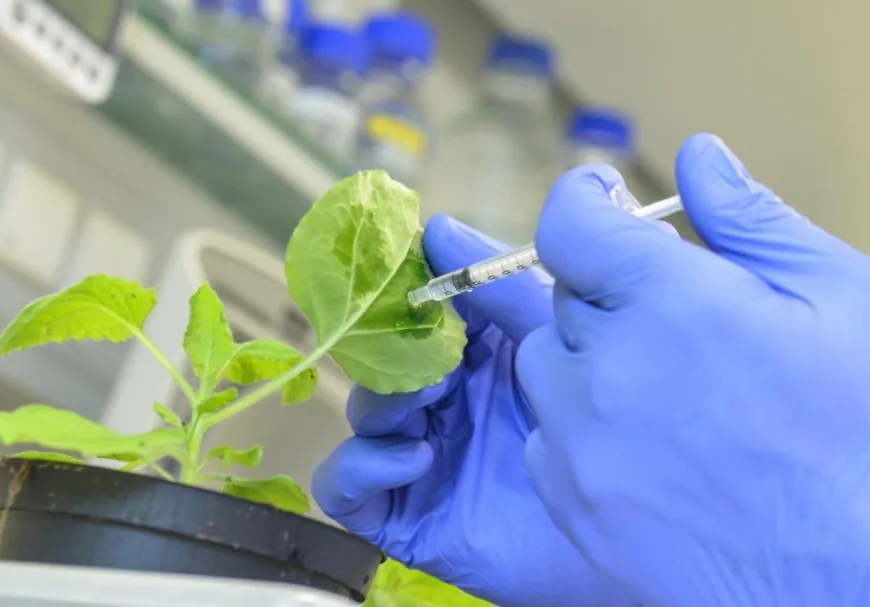Plant-Based Vaccines Market Paving the Way for Sustainable Healthcare
The global plant-based vaccines market is estimated to be valued at US$ 130 million in 2024 and is expected to exhibit a CAGR of 51% over the forecast period 2024-2030.

The plant-based vaccines market has great potential in alleviating the current healthcare challenges and transforming vaccine production. Plant-based expression systems offer numerous advantages over traditional production methods including lower costs, greater scalability, and lack of pathogenic contaminants. Top firms in the industry such as Medicago, iBio, and Icon Genetics are leveraging plant-based platforms to develop affordable and effective vaccines for infectious diseases and cancer.
The global plant-based vaccines market is estimated to be valued at US$ 130 million in 2024 and is expected to exhibit a CAGR of 51% over the forecast period 2024-2030.
Plant-based systems provide a sustainable alternative to generate vaccines and help overcome the limitations of egg- and cell-based manufacturing technologies. These expression platforms utilize tobacco, safflower, chloroplast, or transient systems to develop recombinant subunit vaccines mimicking the immunogenic regions of a pathogen.
Key Takeaways
Key players: Key players operating in the plant-based vaccines market include Medicago, iBio, Icon Genetics, MediVector, and Bioquell. Medicago is currently developing a plant-derived COVID-19 vaccine candidate while iBio aims to utilize its plant-basedFastPharming System to generate vaccines against various infectious diseases.
Key opportunities: The pandemic has highlighted the urgent need for scalable and rapid vaccine production methods. Plant platforms can help overcome traditional manufacturing bottlenecks and facilitate the development of vaccines for emerging pathogens. Areas such as cancer vaccines, combination vaccines, veterinary vaccines also offer significant growth opportunities.
Global expansion: With successful clinical trials, plant-derived vaccine candidates may get approved and commercialized worldwide. This could further validate plant expression systems as a mainstream production platform. Partnerships with emerging markets will also help expand the global footprint and accessibility of plant-derived vaccines.
Market drivers
One of the major drivers for the Plant-Based Vaccines Market Growth is the inherent advantages these platforms provide over egg- and cell-based methods. Plants offer greater scalability, lower costs, lack of pathogenic contaminants, rapid growth, and ability to perform post-translational modifications crucial for immunogenicity. These characteristics make plant systems uniquely suited for producing large volumes of current and future vaccines needed to protect against diseases worldwide.
PEST Analysis
Political: Governments worldwide are promoting vaccine production and R&D through funding to deal with infectious diseases. This is encouraging companies to develop plant-based vaccines.
Economic: The high cost of traditional vaccine production methods is driving researchers and companies to explore plant-based alternatives which can be less expensive. Successful development of such vaccines can reduce financial burden of vaccination programs.
Social: Many people prefer plant-based vaccines due to perception of greater safety compared to traditional vaccines. This social preference is boosting research on plant-based options.
Technological: Advances in plant molecular pharming and biomass production techniques are facilitating successful expression of vaccine antigens in plants. These technological developments are helping address previous challenges in stability and scale-up of plant-made pharmaceuticals.
The plant-based vaccines market in terms of value is highly concentrated in North America and Europe currently. Strong presence of leading research institutes and manufacturers in these regions has driven earlier adoption of plant-made vaccines. However, the Asia Pacific region excluding Japan is emerging as the fastest growing market for plant-based vaccines. This is attributed to rising government focus on immunization, increasing healthcare expenditure, and growing biologics production capacity in countries like China and India.
The fastest growing regional market for plant-based vaccines is expected to be Asia Pacific excluding Japan. Countries like China, India and South Korea are witnessing tremendous economic development which is increasing healthcare budget allocations. At the same time, these nations are actively working to establish themselves as global biopharmaceutical manufacturing hubs. Their expanding biologics production infrastructure and talent pool will aid the growth of the plant-based vaccines market in Asia Pacific region during the forecast period.
Get more insights on Plant-Based Vaccines Market
For Deeper Insights, Find the Report in the Language that You want
About Author:
Ravina Pandya, Content Writer, has a strong foothold in the market research industry. She specializes in writing well-researched articles from different industries, including food and beverages, information and technology, healthcare, chemical and materials, etc.












